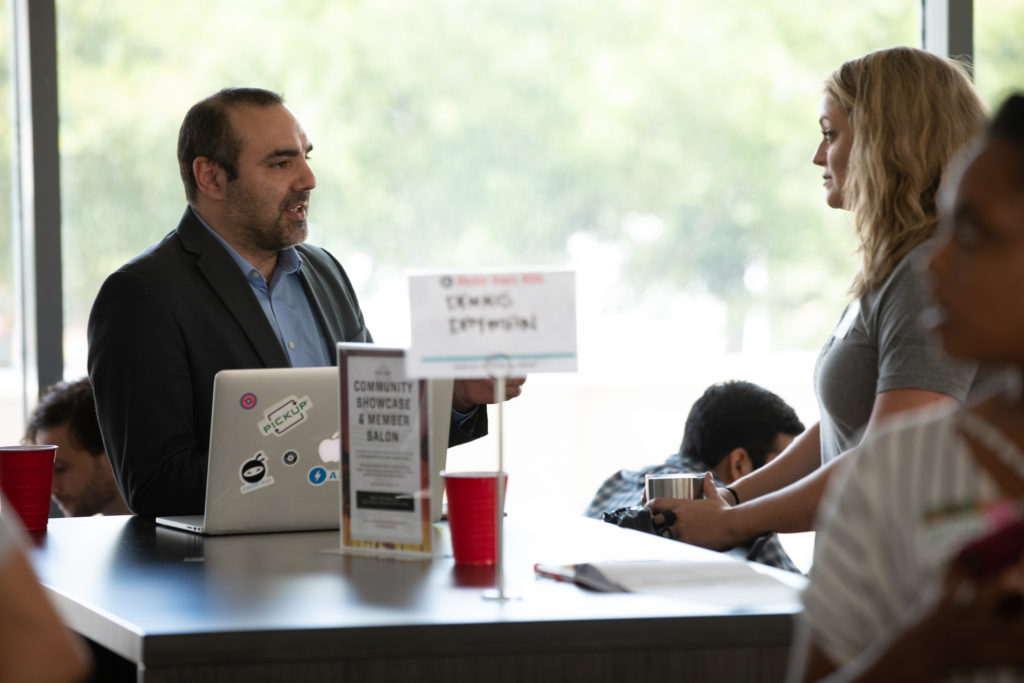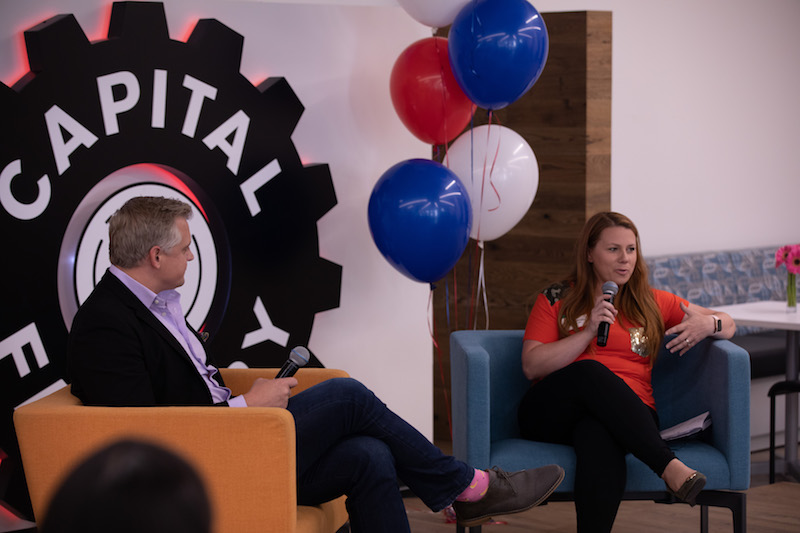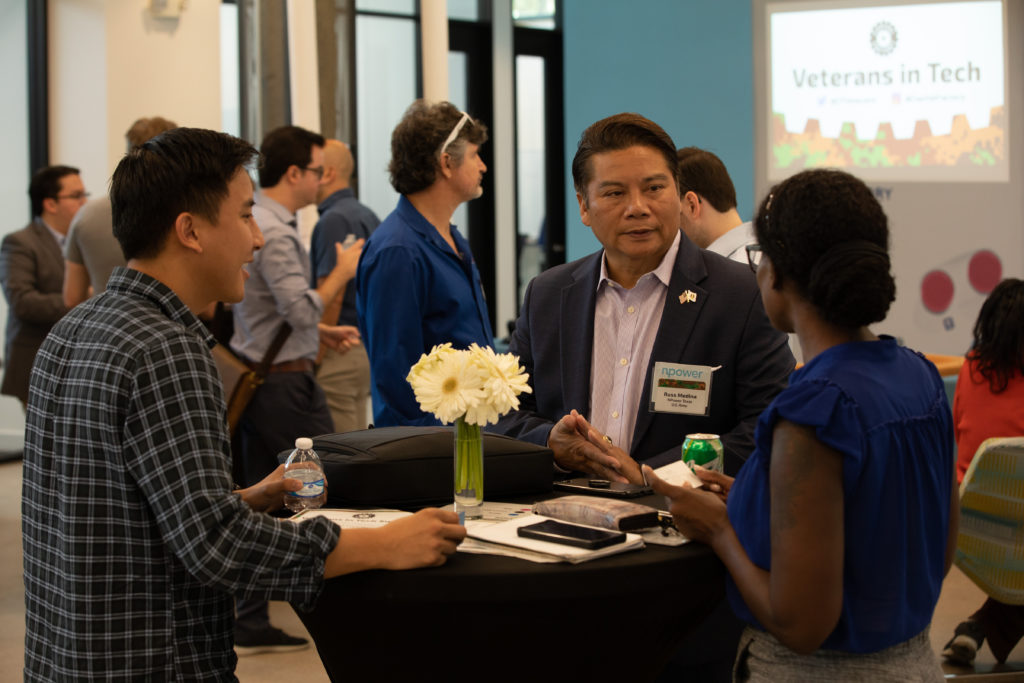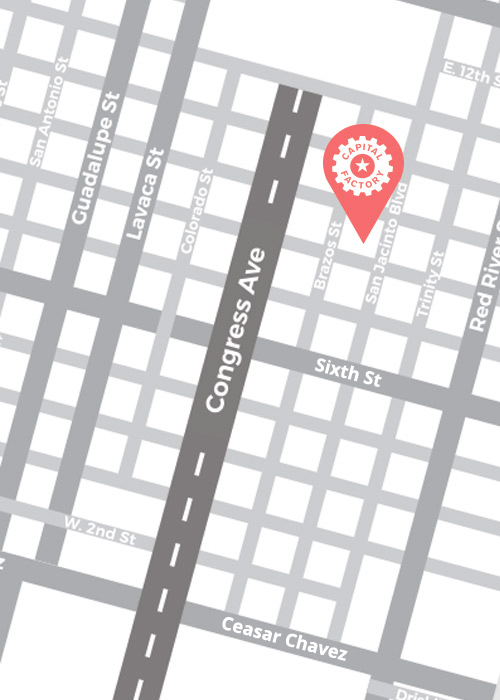THE CENTER OF GRAVITY FOR ENTREPRENEURS IN TEXAS


“It’s important to give veteran’s options. Let them know what resources are available so they can decide what route to take— whether that be entrepreneurial, nonprofit or corporate. It’s powerful to be aware of the resources available to you,” noted Robert Everhart, Recruiting Lead at Accenture Federal Services, on September 17th at Capital Factory’s inaugural Veterans in Tech Summit in Dallas/Fort Worth. Capital Factory is committed to increasing diversity in the tech community by presenting valuable opportunities and resources to veterans looking to join the tech ecosystem.
This was our first Diversity, Equity and Inclusion (DEI) summit dedicated to veteran entrepreneurs, but it certainly won’t be the last. We look forward to working with local leaders such as Craig Cummings, Capital Factory’s Director of Military and Veteran Affairs, to uplift the veteran entrepreneurial community. Craig often thinks of our space as Fort Capital Factory, home to groups like Army Applications Lab, AFWERX, Defense Innovation Unit, and Bunker Labs, among others. Capital Factory is a strong, structural support that allows veterans within the startup community space to maintain the meaningful connections they made while serving, and meet even more organizations looking to support them.
The Veterans in Tech Summit started off with a networking lunch which then led to a Keynote speech from Jason Dempsey, Co-Founder of MILLIE; an online community and marketplace that provides military families with information and support to ease the stress of frequent relocations. Jason taught for three years in West Point’s Department of Social Sciences and has led many research reports related to the military, veterans and society. He started off by pointing out that although finding a career is a challenge for all entrepreneurs, it can be especially challenging for veterans. They’re trying to figure out who they are outside of the military, and even more importantly, how to transfer their military skills into the civilian workforce.
Jason identified three phases that veterans face:
- Veterans transition. Grappling with the move from service to veteran, then becoming a veteran entrepreneur.
- Entering the tech space. Veterans identify tech as a possible career option.
- Veteran Entrepreneurship. Veteran communities help each other by providing resources and industry guidance.
According to Jason, veterans transition is most important. There isn’t a roadmap for entering the workforce after the military— nobody is handing you a badge that puts you on a clear path of where to go. Being in the military is a unique and challenging experience, but it doesn’t mean you’re automatically equipped to handle anything. Jason finishes his speech by advising veterans to be both an entrepreneur AND a citizen. He further explains that being a veteran is about an effort to protect and build something better than you, even out of uniform you still have a role in sustaining democracy and making a difference.
“You have to know the tech and know the industry well enough to bring that technology in. That’s where we are in terms of transition in the tech ecosystem.” –@Jason_K_Dempsey, Co-Founder of @gomillie_com pic.twitter.com/CfWGELXa6D
— Capital Factory Vets ⚙️ (@CFVeterans) September 17, 2019
Empowering, Training & Employing Veterans
Jason’s keynote was followed by an educational discussion on trainings, programs and resources available to veterans transitioning into the tech industry. VR Small, Executive Director at Veteran Women’s Enterprise Center, kicked off the panel by asking: What should our veterans be doing to take advantage of tech opportunities?
Tad McIntosh, President at Humcap LP, suggested that veterans utilize the transferable knowledge and training from their time in the military when they’re ready to enter the job market. Being able to re-tool and re-skill is a valuable advantage, so being aware of what you already bring to the table is crucial.
Russ Medina, Executive Director at NPower Texas, informed us about the career placement and support that his company offers. Russ made it clear that he wants to work with higher learning, not replace it. The goal is to give people professional training to build a resume for an internship or apprenticeship in corporate America. It’s also important to leverage the resources you already have— be trailing edge rather than bleeding edge.
Robert Everhart, Recruiting Lead at Accenture Federal Services, discussed Accenture‘s Veteran Technology Training Program and certification platform. This free program lasts two months and equips veterans with the technical skills they need to position themselves for employment.
As the panel neared its conclusion, VR made it a point to highlight Skill Bridge, a program that connects transitioning service members to career training opportunities. For those that want to take that first step, learn more and apply here!
“Small businesses are a great opportunity for a career. How can you get in there and become a staple for that company?” -Tad McIntosh, President and CEO of @HumCapLP pic.twitter.com/qPuRtGkS5f
— Capital Factory Vets ⚙️ (@CFVeterans) September 17, 2019
Epic Office Hours & Roundtable Discussions
For those that aren’t familiar, Epic Office Hours are a series of lightning speed mentoring sessions that pair startup founders with serial entrepreneurs, corporate executives and investors. Attendees receive a curated schedule of meetings based on various factors including stage and industry. This is a great opportunity to connect with the local entrepreneurial community and receive valuable feedback on your venture.

For those not participating in Epic Office Hours, Craig and Jason led a discussion on “Entrepreneurial Ecosystems for Veterans in Tech”, diving deeper into Jason’s research on the landscape for veteran-founded tech startups. It turns out that collecting accurate data on veterans’ entrepreneurial efforts is actually quite difficult. It’s even harder to find these stats among tech startups specifically. So, how can we find out more about the universe of veteran-founded companies?
Jason explored popular ecosystems for veterans while also examining similarities and differences with the overall startup community. It’s hard for veterans to enter entrepreneurship straight from military service– they have to be careful about choosing the right ecosystem in the right location. Jason states, “Veterans that have been around the world, and the first thing they want to do is go home.” This is problematic because there often aren’t as many opportunities available to veterans near their last duty stations. Aspiring veteran entrepreneurs should keep in mind that it’s all about being able to pivot and adapt in order to maximize your chance of success.
The Transition from Service to Corporate
Our programming finished off with a Fireside Chat featuring Adam Marr, Management Consultant at Accenture and Co-Founder at the Warrior Angels Foundation; moderated by Sabrina Wojtewicz, Southwest Regional Executive Director at Bunker Labs. Adam’s brother struggled with brain injuries upon returning home from service. After he witnessed his brother grapple with these issues during his transition, Adam vehemently sought out a treatment that proved to be effective for his brother. Though, he soon learned that not everyone had access to the same treatment, so Adam decided to create a non-profit that raises funds and performs outreach to those affected by traumatic brain injuries; offering additional medical care options that aren’t currently offered to active duty or veterans.
When it comes to transitioning into an entrepreneurial space— Adam explains that veterans are both problem solvers and leaders, but that doesn’t mean adapting comes easy. There is a huge gap between active service and finding a new career, Adam concludes, it’s not enough just to introduce them to the tech space, “We have to help pave the way.”
Bunker Labs led us into happy hour on a similar note by encouraging guests to take the stage and pitch their experiences and career interests for audience members to provide leads or offer some guidance.

Starting the Conversation for Supporting Veteran Founders
By the end of the afternoon, attendees had established shared experiences and familiar issues that arise as veterans explore an entrepreneurial route.
Jason Dempsey left us with some final thoughts, “This was a great kick-off event. It’s the cooperation you need to build a good ecosystem and it’s neat to see the cross-pollination between Austin and Dallas.”
Veterans in Tech is only the tip of the iceberg for us at Capital Factory. We look forward to continuing these discussions with the veteran community in Texas, especially at our upcoming Veterans in Tech Summit in Austin on November 12. Stay connected with us through our Dallas Tech Live or Austin Tech Live mailing lists and follow us @CFDefense and @CFVeterans for updates.

Comments
Categories
Tags
Questions?
By Appointment Only
Our doors are open! Reach out to Members@CapitalFactory.com to book your private, in-person membership tour.
